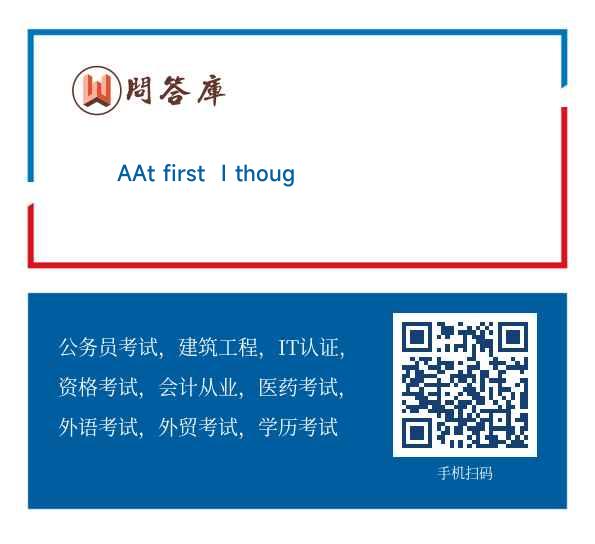AAt first I thought it was just useless e-mai
问题详情
A
At first, I thought it was just useless e-mails. It was the end of the weekend and I hadn " t checked my e-mails since late Friday afternoon. There was a long list of messages. Some I re- moved without reading. Others were from friends-l saved those to read later when I had more time.
One stood out from the rest for two reasons. The first was the name, Maher Nawaf, which I didn" t recognize. The second was the subject line: "pleas papers. " Clearly, the e-mail was from someone who did not have a complete mastery of the English language.
The message was from an Iraqi, a university research scientist in Mosul who wanted permis- sion to reprint a research paper I had written. As a scientist, I" m used to getting these kinds of re- quests; it " s part of the give and take among researchers that I especially like. I wrote back the next day, asking for more information about the type of work he was doing. I also wished him and his family best for their safety and well-being during this dangerous time in his land.
A couple of days later, his reply appeared in my inbox. It read, in part: "hi dear Dr. I" m very happy to hear good news from you and your help, also I" d like to thank you for your feelings towards me and my family _ thank you very much for help I want to tell you that I" m ready to help you in mosul university/iraq if you need that. "
Maher also explained in his broken English that he was interested in a paper I" d written on the use of lacto bacillus acidophilus (a healthy product that can be found in yogurt(酸奶) and other foods). It was his hope that he could use my findings to help find a treatment for gastrointestinal(消化系统的) illness. He signed off: "warmest regards to you and lovely family. "
Despite his difficulty with the language, he had painted a picture for me that was far more than a simple request for information. The humanity displayed(流露出的) in his message made me want to both smile and cry.
56. Why did the e-mail from an Iraqi catch the author" s attention?
[A] The subject line was not written in standard English.
[B] It was not completely written in English.
[C] The sender " s name seemed familiar.
[D]it had a short subject line.请帮忙给出正确答案和分析,谢谢!
参考答案
正确答案:A
第三部分:阅读理解参考译文A起初,我以为只是些没用的电子邮件。这又是周末了,我从上周五开始就没有查我的邮件。有一长列信息。有些没用的我删除了。其他是来自朋友的——我想以后有时间了再读。有一个比较与众不同,有两个原因。第一个是名字,MaherNawaf,我不认识。第二个是主题栏“想要论文”。很明显,这封信是来自没能完全掌握英语的人。这封信来自一个伊拉克人,在摩苏尔的一个大学里做研究的一位科学家,他希望我能允许他复印我之前写过的一篇论文。作为一个科学家,我习惯了收到这种请求;这是我特另q喜欢的研究人员之间的平等互换的一部分。第二天我回信了,请求得到关于他工作的更多信息。我也祝愿在这国家危险的时刻他和他的家人能平安幸福。几天后,我收到了他的回信。上面写着:你好,亲爱的教授,我很高兴能从你那里得到好消息,还有帮助,也很感谢你对我和我的家人的关心……我想说的是我很乐意在伊拉克的摩苏尔的大学里帮助你,如果你需要的话。Maher也用断断续续的英语解释道,他对我写的关于嗜酸乳酸菌(在酸奶和其他食物中发现的一种健康的产品)的一篇论文感兴趣。他希望能通过运用我的发现找到一种治疗消化系统疾病的方法。他最后写道:对你和家人致以最温暖的祝福。尽管他语言方面的困难,他给我的不只是一个简单的论文请求,从他的语言中流露出来的善良的人性让我想笑又想哭。56.A【精析】细节题。由文章第二段可知,这封邮件引起作者的注意是因为它是个不认识的人用不标准的英语写的。所以正确答案是A。
